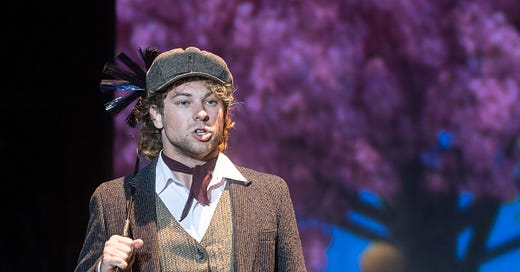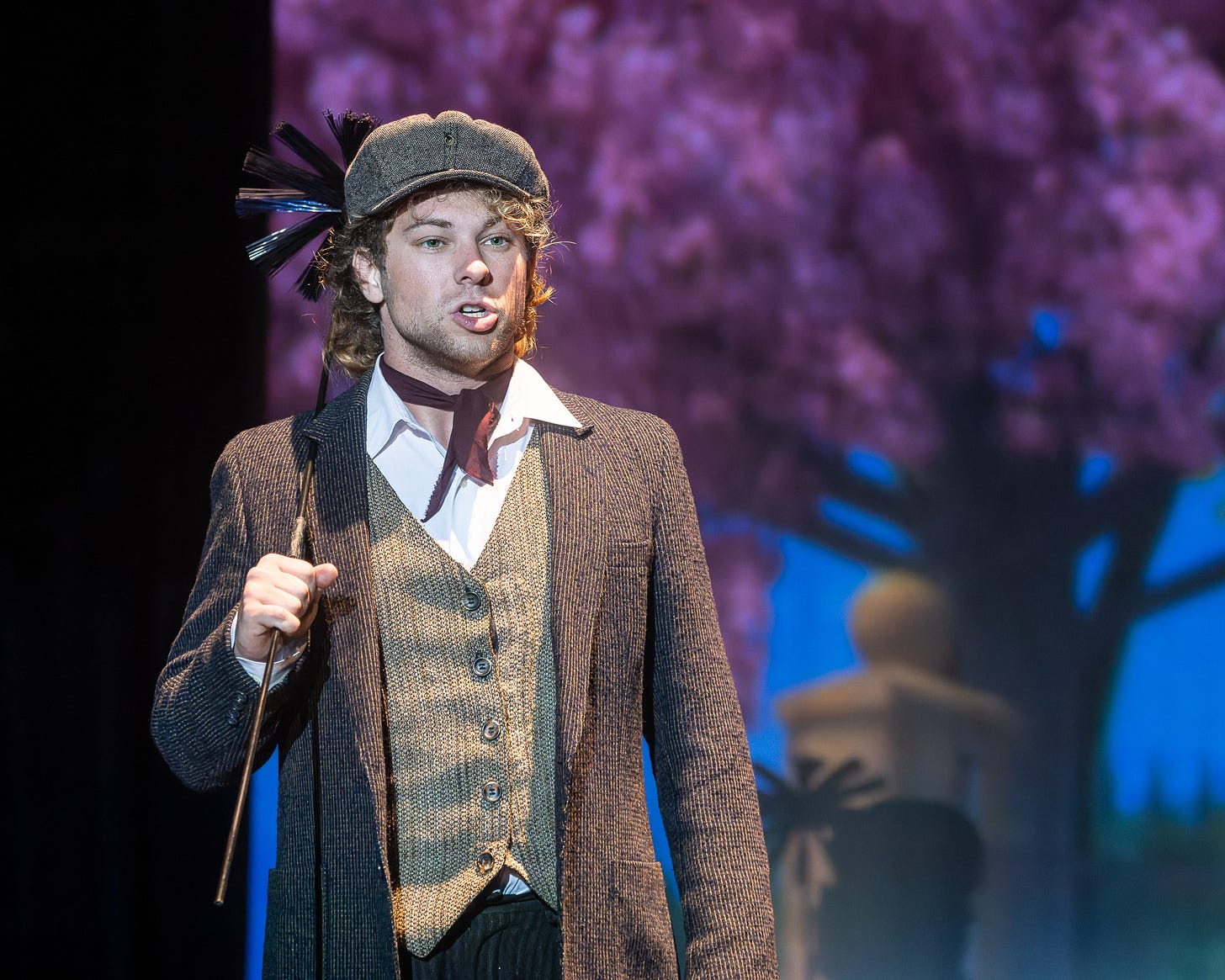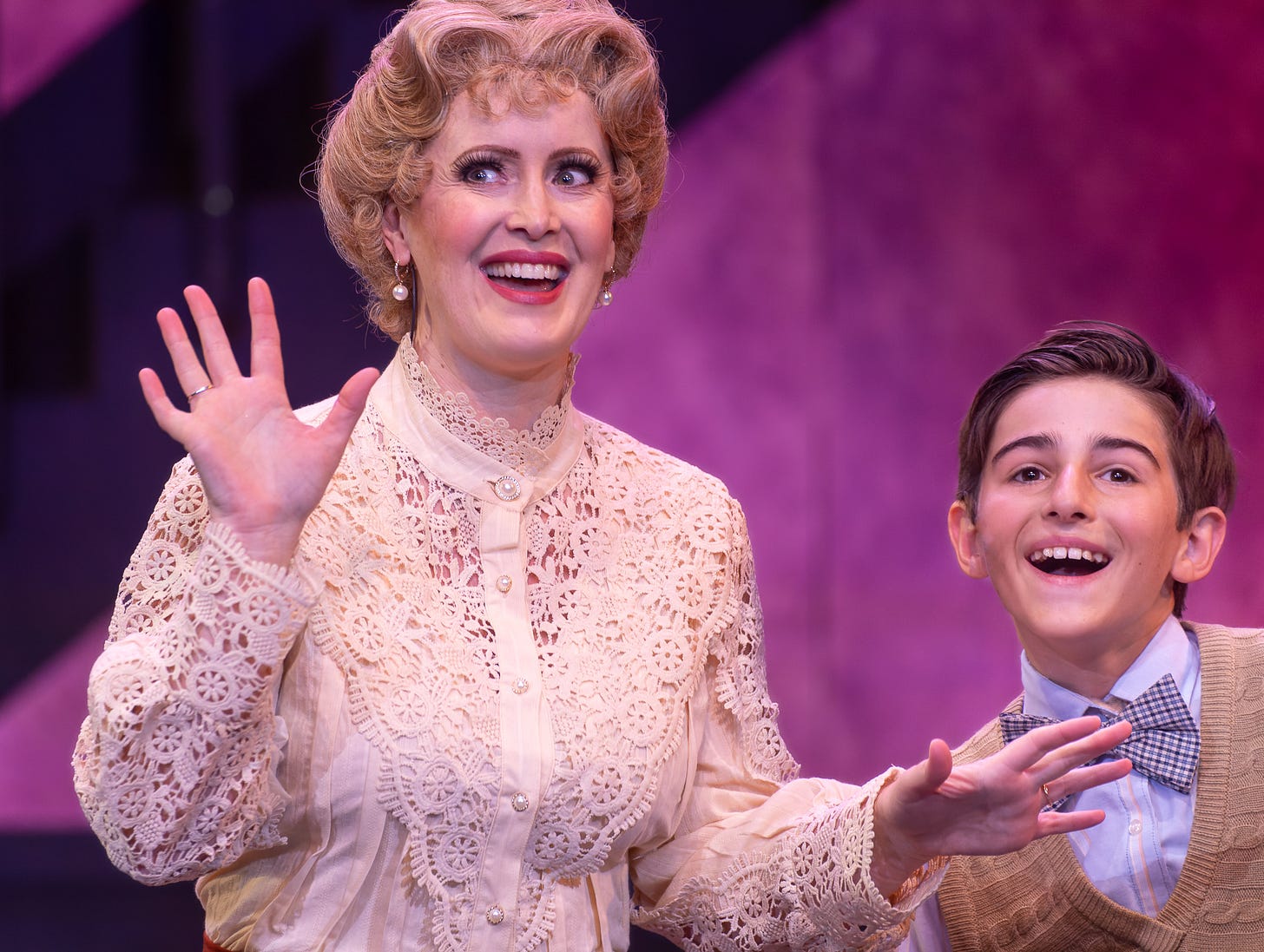What is the word that describes a work so painful and bizarrely off from its intended execution, that it evolves into unintentional comedy?
This was a question asked of me by a student in a teen comedy intensive I’ve been teaching this summer (because I am and forever will be a No-Scabbing Strike Queen™️) and I struggled to answer. The closest I could get was the German word for finding pleasure in another’s pain, but I knew in my heart that wasn’t right.
What is the word that describes a work so inoffensive and blithely joyless that its execution evolves into nothing?
That I knew. It’s the on-stage musical version of Mary Poppins.
I know what you’re thinking, “Julia, get her ass!!” I signaled in last week’s review that I may still harbor a $65 chip on my shoulder for this supremely forgettable Broadway show and now it seems I’m making good on that promise — but don’t cheer just yet. My Poppins-specific ire has been compartmentalized like toys tucked away, shielded from the eyes of the Westminster Rose Center Theater because none of this is their fault (okay, some of it is, but we’ll get into it). And until the WGA and SAG reach a fair deal, I’m sorry to say your pleasure in my pain of ripping this mystical lady a new ares-hole will have to wait until Epic Rap Battles of History throws a Snow White wig on me and pays me a livable wage.
It’s not that I hate Mary Poppins, she just doesn’t belong here.
Perhaps you’re familiar with the lore. Poppins author P.L. Travers was so protective of her nanny-witch that she made sure every brick on the road to the big screen was fraught with obstacles, pushing Walt Disney himself to almost quit the trip several times (P.L., get his ass!!). Eventually, the corporate machine won in the way they always do. Eventually, Travers attended the film premiere, but made clear to anyone within ear-range that she absolutely hated the final product— or more accurately, “couldn’t get a proper read on it” because her eyes were too full with furious tears (I love and respect my Shade Queen). This moment was re-enacted in the 2013 film Saving Mr. Banks where a pixie dust of revisionist history made this scene more misty-eyed acceptance than the truth of regret and rage. Fiction aside, I believe it was a sensible choice from the filmmakers— it’s harder to swallow a sugary spoonful when the chef themselves won’t even come fucking near it.
Of course, we know how the rest goes. The film became a classic. The Sherman Brothers score ubiquitous. The profits from the box office single-handedly paid for the Walt Disney World Monorail system (naming their safety network MAPO, as a tribute). And at that year’s Academy Awards, the filmmakers scooped 13 nominations and 5 wins, including a Best Actress trophy for Julie Andrews as Mary, forever cementing their pop culture bond.
But Travers knew something about Mary that we all didn’t, beyond the simple nuances of creator-to-creation. She knew how problematic Mary was as a protagonist. How odd. How alien. How “practically perfect in every way” was meant to read as irony rather than scripture. How Andrews had misstepped this by softening her into a singing and dancing savior, rather than a harsh but fair teacher. That the theme of the piece is less about a British deus ex machina, but rather a lesson in solving your own troubles when you see through another person’s eyes. Through this, it’s easy to form a fantasy argument of a plague on Poppins’ house ever since: every actress attempting to embody her will read uncanny valley; every sequel distributed will be perfunctory; every stage production will only further illuminate her flaws as it zooms in closer to inspect her pores.
And perhaps Broadway producer Cameron Mackintosh was aware of all this. He, being the kind of superstitious that thrives in theatre people, knew the only way to lift the “curse” was to approach Travers directly after Disney approached him. What did she want? How could he help? Travers, then 93— but still sharp as a stiletto— immediately required “only English writers” pen the book and “no one from the original film” directly be involved (I love and respect my Shade Queen). But this emergency call was perhaps too late to save the house, the children had already grown.
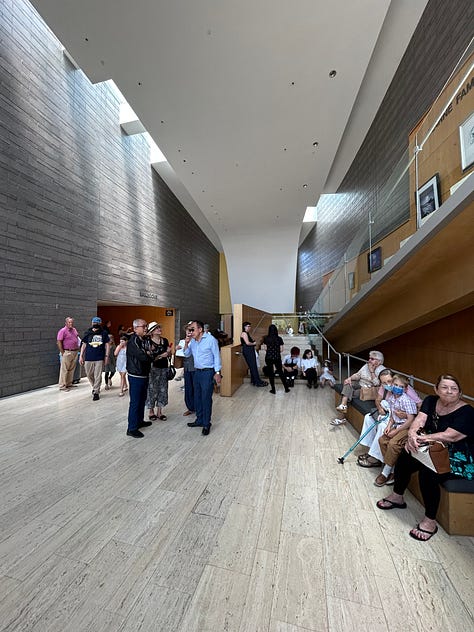
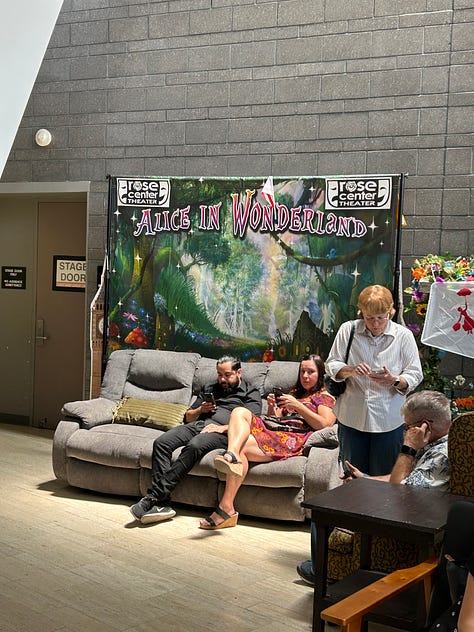

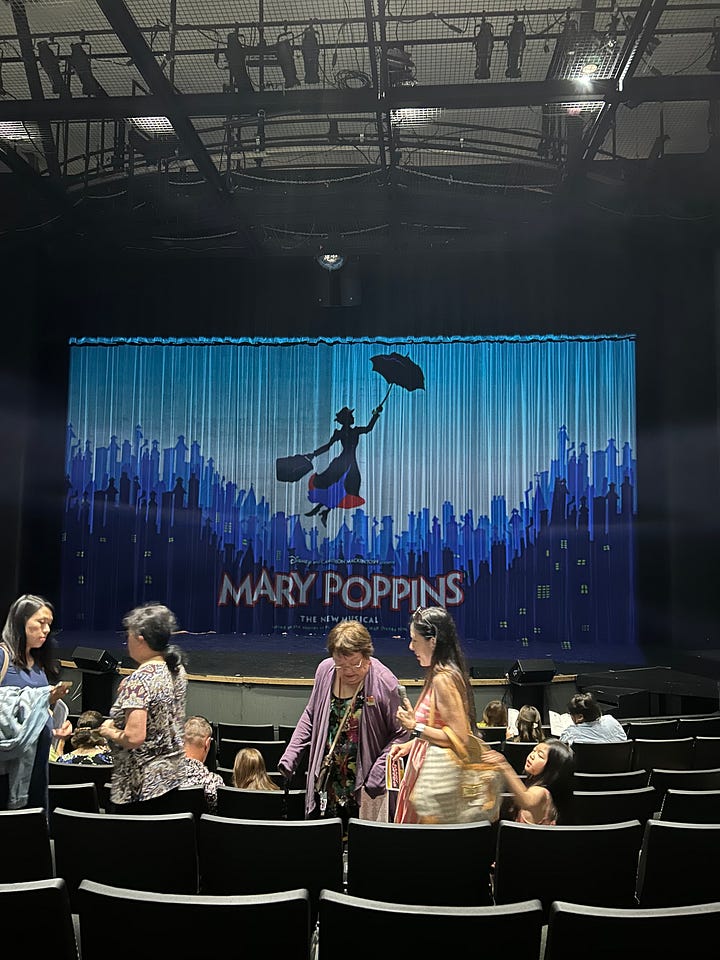
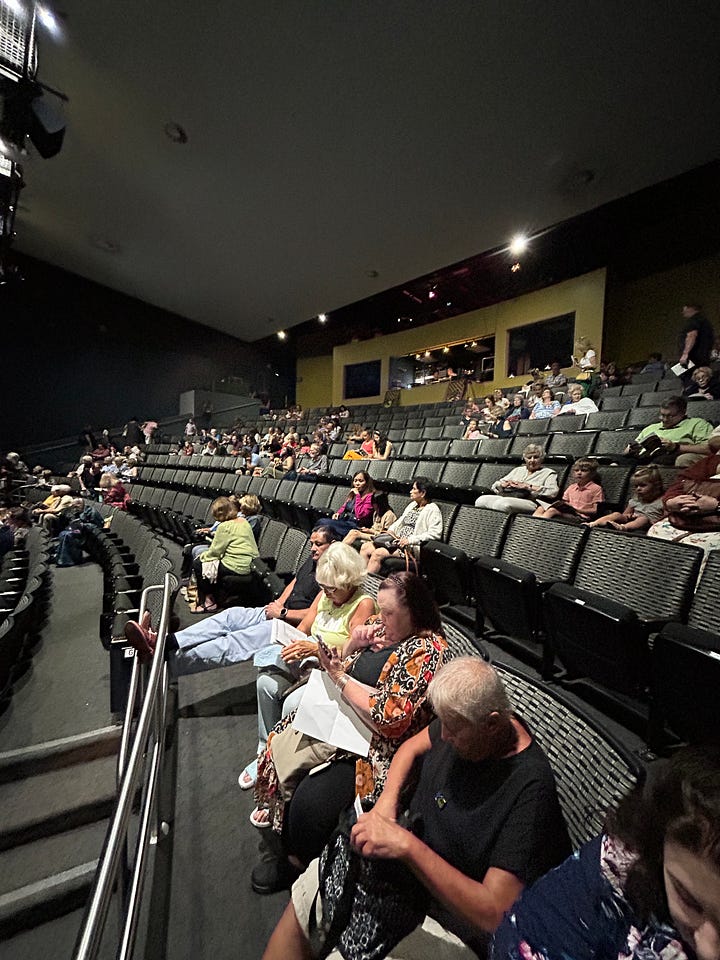

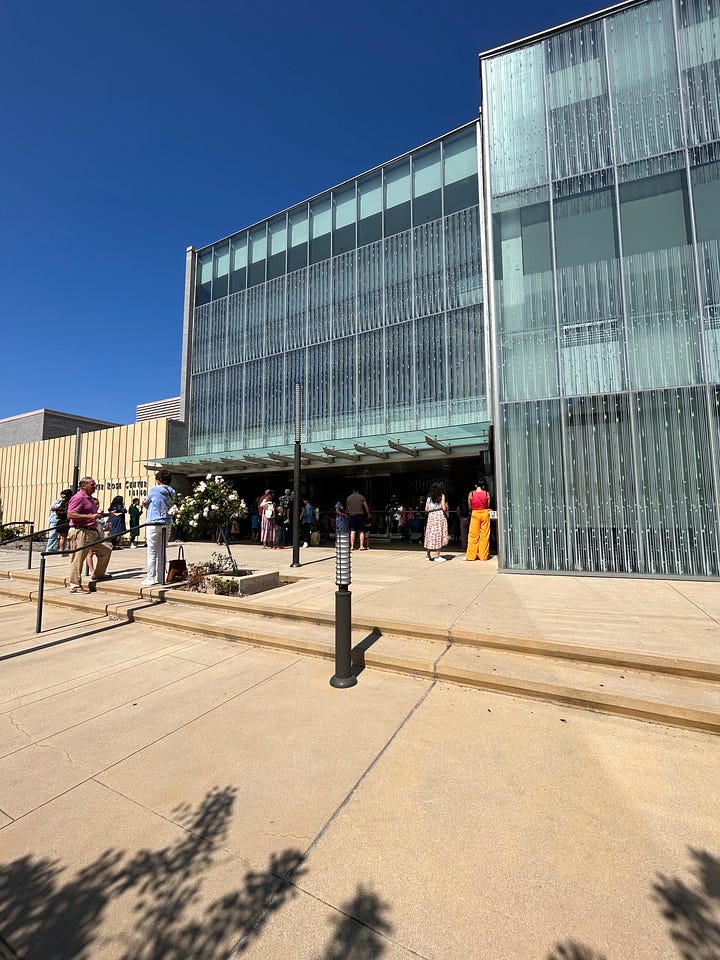
Now we’re at the Westminster Rose Center Theater and I wonder what you want from me. Should I describe the theater’s lobby? (Cavernous with just a handful of art). What about the crowd? (incredibly white, incredibly God). The parking situation? (a structure overlooking a Vietnam War Memorial having a particularly bleak 4th of July tribute unfortunately at the exact time of this matinee). Maybe you’d like to know about the family I saw sprint off during intermission, presumably to attend their own patriotic parties after performing their civic duty of attending theatre? (this isn’t actually unique. I’ve watched families flee at every single Intermission I’ve attended while I mindlessly inhaled Kirkland Signature Snacks from the child-run concessions stand).
Maybe we should just start with the spotlight.
Shuffling into the Westminster Rose Center Theatre is to face its “state-of-the-art-iness”, in a way that all recently renovated buildings shout this fact like a girl who just got bangs. The stadium seating is lush and pristine. The carpets not yet pocked with time. The lights dim and an announcer declares gratitude for all their patrons, but most importantly— 3 local mega-churches with congregants in the crowd. I’m usually of the mind to separate church and stage, but I’ve also performed stand-up for more AC-units than people, so I get the need to force butts in seats.
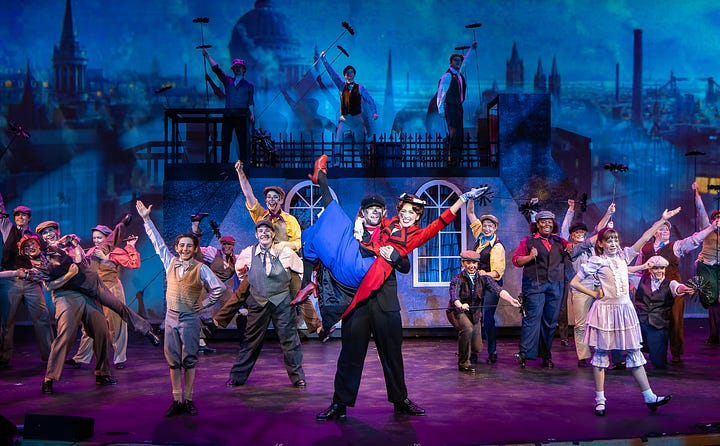
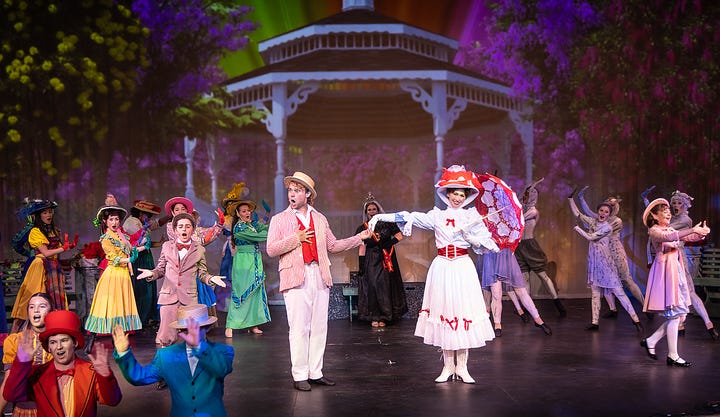
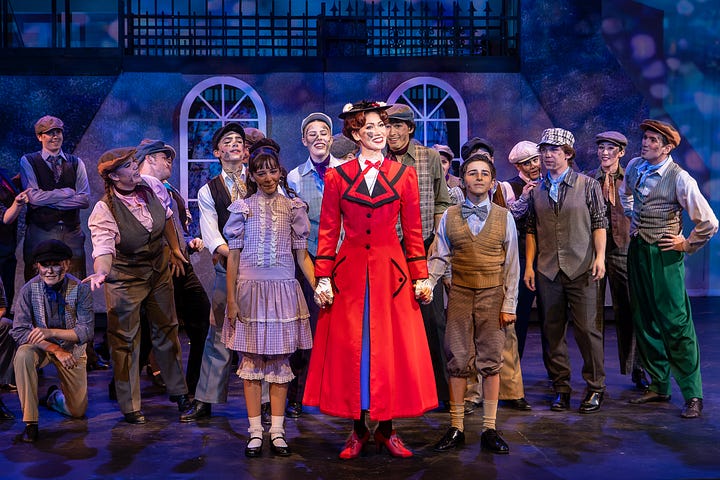

There’s something about seeing a production with real money. The costumes are vibrant and not yet sunken with Shakespeare sweat. The set is a 2-story wonder with practical staircases, shapeshifting like a doll house as it transforms from the Banks family home to the streets of London. A stage-sized screen (the largest I’ve witnessed yet) sits behind the set pieces, shifting backdrops and seasons and of course, marking the eventual arrival of Mary as she appears first as a distant unidentified object, then chugs into frame with the veracity of a Lumiére train (though occasionally reading a bit Windows screensaver). The score is performed by a real, live orchestra, which I almost don’t believe, so accustomed now to the pre-recorded “Musical-ioke” that’s the only option for the smaller, penniless stages who are not chosen by God.
And then, there’s Bert.
He’s the first character to appear to us, played today by college student Brennan Eckberg. Brennan’s Bert is lively, light and joyous— perhaps a testament to this being his official return to the stage after a year-long sabbatical. He sings in the classic cockney, standing by a recreation of the iconic chim-chim-chimneys burned into the retinas of every child who didn’t have a babysitter, but did have a war-weary Disney Sing-a-long Songs VHS tape. He’s halfway through his first verse when a spotlight hits— but not on him. Instead, it moves, searching, then widens. Too wide. Gets small. Too small. It focuses, fixates, then finally finds its intended target as Brennan sings his last high note and readies to exit the stage, spending all of 30 seconds basking in its artificial glow. It’s important to note he was well-lit the entire time.
This isn’t supposed to be a comedy, but this spotlight becomes our runner. Like a surprise party guest. Like the unexpected Spanish Inquisition. It chases performers in haste, never once smoothly nailing its target, every movement echoing the sweaty sentiment of, “Shit, shit, shit!!!” that I imagine its operator invoking as they were given One Job and somehow they still messed it up. I don’t want you to think my highlight of this is punching down, very much the opposite. I love it. I welcome it. I know the unique pain of thinking you’re Hot Shit until someone puts a carnival pistol in your hand and suddenly you forget every god-given aspect of hand-eye coordination. More importantly, I long for it— the gloss of this over-polished production has a numbing effect, and the spotlight is a quick jab that reminds us we’re all alive.
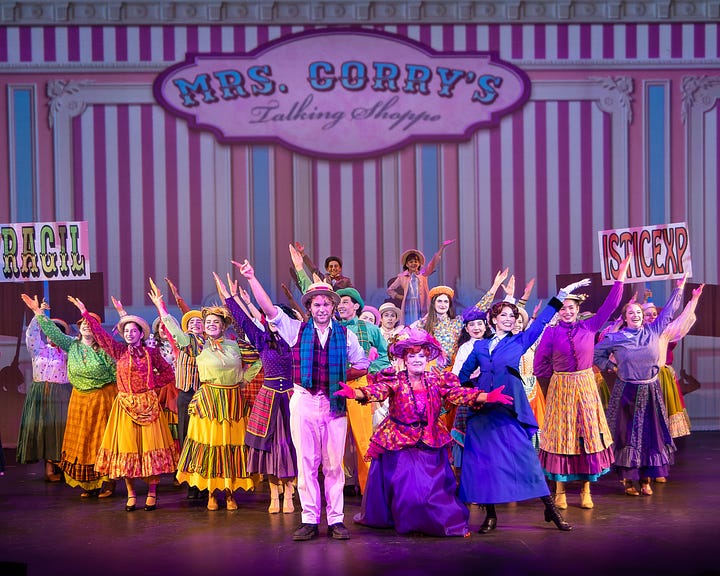
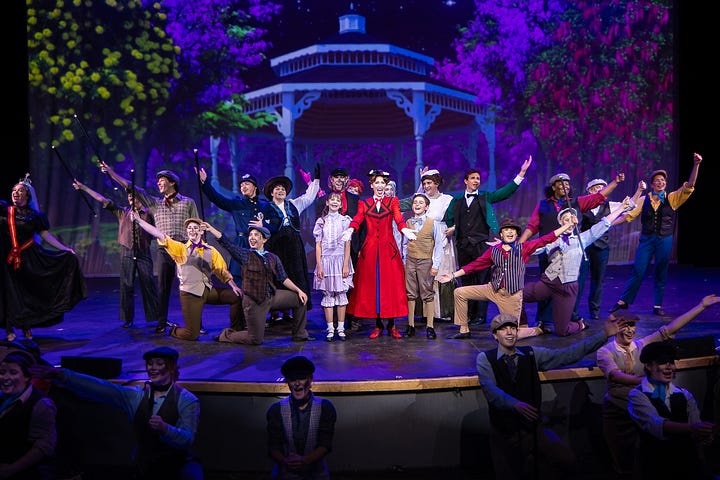
Money is great, but money talks. It yells to the back of the house, wanting you to notice every sparkle of its sequins because somebody went to the trouble of sewing them1. The show’s an overwhelming buffet of extravagance, but break off each perfect aspect and you have more than enough for a whole meal: April Malina is a terrific Mary, all Disney Princess-like poise with a slight sarcastic bite. Her credits include regional productions of Miss Saigon, Hair, and Into the Woods— but I’m most intrigued by her involvement in 3 whole seasons of Rupaul Drag Race’s “Rusicals”. In these episodes, the show employs professional singers to provide the backing track for drag contestants to lip-sync. I instantly cruise through my memory vault, desperate to find all the times when April’s pristine talents were torn to shit by the off-key warbling of Kandy Muse and Vanessa “Vanjie” Matteo (which I say with the ultimate respect and love).
Kristin Henry is an excellent Winifred Banks, embodying her program-proclaimed "dream role” with a motherly calm. She utilizes her bio to shout-out her fiancé and their upcoming nuptials, making me long for the opportunity to shout my own love in 6-point font. Cat Valentine is an excellent utility player, balancing between Bird Woman and sentient doll, which is every inch as haunting as you’d imagine if only to be saved by Cat’s beautiful modern dancing. Taven Blanke deserves his own flowers, making a meal of every movement as the sentient sculpture Neleus (good god there’s a lot of sentient objects in this show). He’s the star of the show as far as I’m concerned and his expertly fluid motions elevate every second he’s on stage.
Our children are quadruple-cast and this afternoon played by Waverly Craver and Charlie Firlik as Jane and Michael, respectively. Waverly, perhaps sensing the competition with her co-Janes, has decided to edge to the front by declaring in her bio that she grew up in England with her own “practically perfect nanny” and that “she hopes you’ll agree she was made for this role!” I’m in awe of this 5-star goading brashness and mentally bookmark it like a MentalFloss article outlining all the ways I, a woman, can reverse sexism by eliminating the word “sorry” from all my work e-mails. I hope you’ll agree I was made to comment on overly-ambitious musical theatre!!!
Everyone wants to be here, that much is clear. Whether the Rose has enough space for them is another story. Our town scenes are lively, but over-stuffed. Our choreography is advanced, but expanding its margin for error with every added dancer. When Cat’s Pigeon Lady, perhaps responding to this over-crowding, situates her “Feed the Birds” number too down-stage, she accidentally forces her fellow actors to struggle to bypass her with just a feet between them and the edge, forcing them to face their own mortality2. In the same scene, Mary and Bert and Jane and Michael are joined by an entire Church-like choir who elevate the melody to holy heights, but ultimately make me wonder whether this was part of the story’s canon or a requirement of the aforementioned mega-churches’ financial support.
I’m struck by the fact that for some of these performers, this is not their first trip to number 17 Cherry Tree Lane. Not even their first Disney musical at this theatre (just this past February, RTC mounted the Broadway version of The Little Mermaid). As I write this, multiple on-stage Mary’s are gearing up in places like Michigan and Florida and New York and Budapest and I’m reminded of the redefining magic of time. That Travers was correct to protect her nanny, but incorrect in thinking she was still hers. That I was correct in thinking the blandness of this IP-driven spectacle paled in comparison to seeing the uber-original In the Heights, but incorrect in thinking that mattered any lick of a damn.
Mary Poppins is still a baffling play with a weird protagonist and an adapted story that stretches like taffy, but so is Funny Girl and so is CATS and so are so many musical theatre classics that don’t need to make sense, just stand the test of time. And as Poppins gets re-performed and re-performed, city to city, country to country— its critical panning will get lost, like a memory of what it’s like to be a care-free kid. Its theatrical significance will get redefined, as the Mother becomes a performer’s “dream role”. As each visit to Cherry Tree Lane embeds into an actor’s psyche like a holiday visit back home. Sometimes when it comes to family-friendly theatre, it doesn’t have to be that serious. Sometimes you wanna just space out, sit back, and fly a kite.
Mary Poppins unfortunately took its final bow on July 16th, but you can get your tickets for RTC’s upcoming production of Man of La Mancha here (running September 10th-23rd). To subscribe to their newsletter, click here.
Join me next week, when I soar from the depths of Orange County to the Atwater Village Theatre, where a production of the ‘80s Sci-Fi Space Opera Starmites makes me cry in a way you’ll never expect.
I’m naturally reminded of the most iconic moment in television illuminating this point when Dana Wilkey on Real Housewives of Beverly Hills instead of sticking her hand out for a proper introduction, simply pointed to her designer sunglasses and said, “Did you know? $25,000”. You pay that much for sculpted metal, you gain a TSA Pre-check to bypass politeness.
And I didn’t have space to mention this in-article, but please know that every second of this scene had me recalling the best thing Kelsey Grammar has ever done captured on film. You know the clip.

